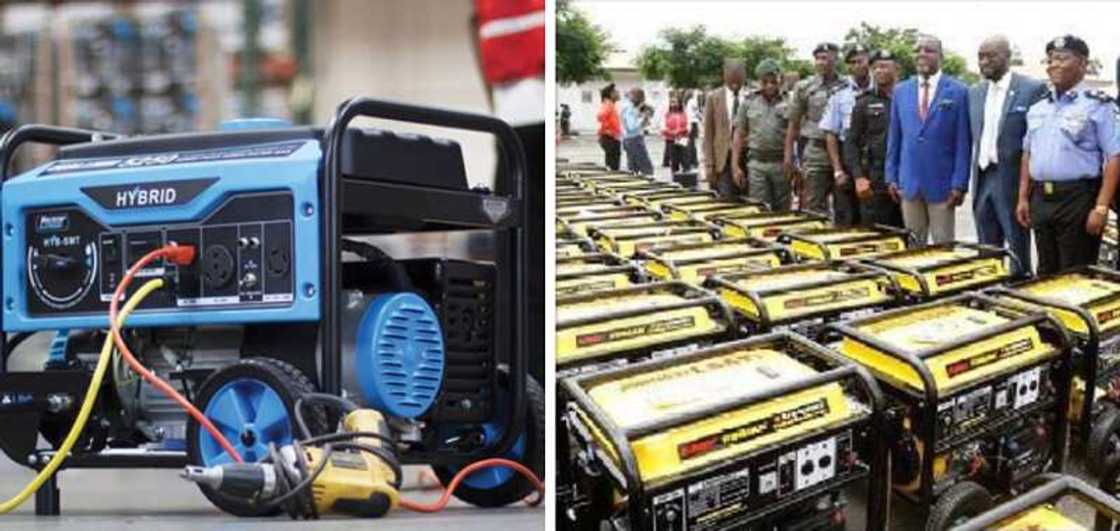Power Generators, Vehicles in Nigeria to be Periodically Tested by FG
- Due to the dangers of toxic gases released into the atmosphere the FG is set to begin testing generators and vehicles.
- The periodic test is to ensure that Nigerians and the environment are protected from the hazards of injurious emissions.
- Businesses that use power generators for as long as 15 hours or more would henceforth be placed under close watch by the NESREA.
PAY ATTENTION: See you at Legit.ng Media Literacy Webinar! Register for free now!
The Federal Government has announced that it will soon commence periodic testing of generators and vehicles for toxic and gas emissions in order to reduce air pollution in the country.
This was disclosed by the Minister of Environment, Muhammad Abdullahi, at an event in Abuja, the nation's capital on Monday, January 23, 2022.
The event was the official flag-off of the two programmes; the National Generator Emissions Control Programme (NGECP) and the National Vehicular Emissions Control Programme (NVECP).

Source: UGC
Worthy of note is the fact that the programmes were finally launched 9 years after it was first announced in 2014 by the National Environmental Standards and Regulatory Enforcement Agency (NESREA) during the administration of ex-President Goodluck Jonathan.
PAY ATTENTION: Follow us on Instagram - get the most important news directly in your favourite app!
The minister said that the initiative, which was conceived out of a need to protect Nigerians and the environment from the hazards of injurious emissions will be implemented and enforced by NESREA.
Implementation of the programmes
Abdullahi stated that hotels, restaurants, companies and other service-providing businesses that run power generators for as long as 15 hours or more would henceforth be placed under close watch by the NESREA.
The NGECP would focus on stationary sources of pollution which includes generating sets, while the NVECP will focus on mobile sources of pollution, which are motor vehicles plying the roads.

Read also
2023: More pressure on Mahmood Yakubu as CSOs urge INEC to fulfil obligations over PVC collection
He added the implementation of the NGECP would commence with generating sets with a capacity of 10kva and above. The generators would be monitored to attain the lowest limit of Euro III emission standard as agreed at the ECOWAS regional level.
Also speaking on the new initiative, Prof. Aliyu Jauro, the director general of the National Environmental Standards and Regulatory Enforcement Agency (NESREA) stated that the defaulters will be sanctioned after a series of warnings to fix the problem, if not adhered to.
The programmes, which will involve the periodic testing of generators and vehicles for toxic gas emissions will be under the Public Private Partnership (PPP) scheme. It is expected that the introduction of the programmes will reverse the health hazards caused by injurious gases released into the atmosphere by these engines.
Lagos Tops States With Highest Use of Electric Generators in Nigeria
According to an earlier report by Legit.ng, it was discovered that Nigeria is one of the biggest importers of electric generators in Africa. Due to an abysmal power sector, the importation of electric generators has been on the rise since 1996, reaching a peak in 2013 with the importation of $262.5 million worth of generators.
Data by the United Nations International Trade Statistics Database, UN Comtrade, suggests that no less than $2.4 billion was spent by Nigeria in the last 24 years, on the importation of generators.
According to the report, Lagos, Nigeria's commercial capital led other states with the most use of electric generators. Following poor power supply and frequent collapses of the national grid, the use of generators reached an all-time high in Lagos in June 2022. It however declined since July 2022 as a result of improved power supply in some locations.
Abuja, Kano and Rivers come behind Lagos in the list of states with the highest use of generators in Nigeria.
Source: Legit.ng



